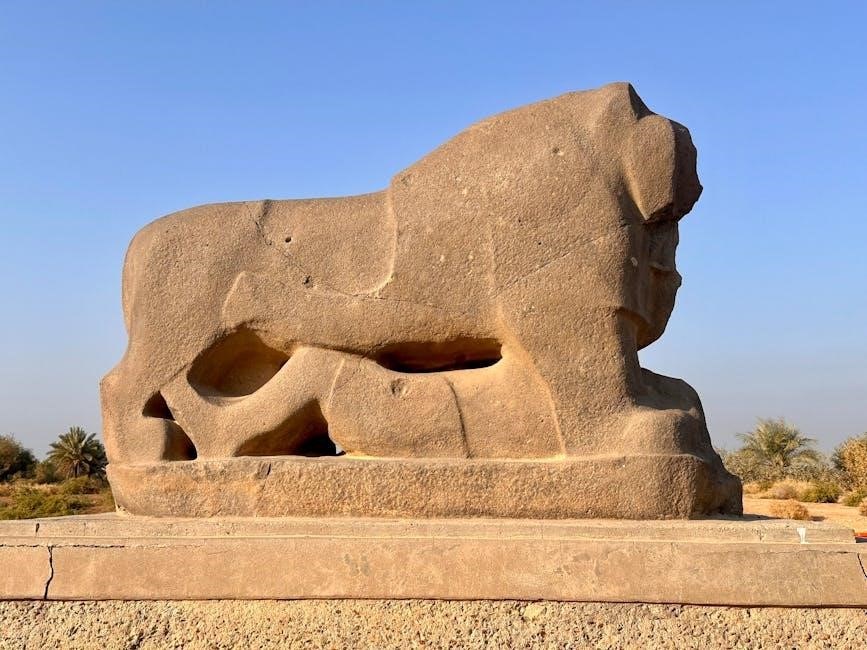This book by Rudolph R; Windsor explores the history of ancient Black civilizations, tracing their influence from Babylon to Timbuktu, challenging Eurocentric narratives and highlighting their cultural legacy․
1․1 Overview of the Book
From Babylon to Timbuktu, written by Rudolph R․ Windsor, is a meticulously researched book that delves into the history of ancient Black civilizations․ It explores their migration from Mesopotamia to Africa, highlighting their cultural, academic, and societal contributions․ The book challenges Eurocentric narratives by emphasizing the significance of Black races in shaping global history․ Available in PDF format, it offers a detailed account of Black legacy, making it accessible for modern readers to explore and understand these untold stories․
1․2 Author Background: Rudolph R․ Windsor
Rudolph R․ Windsor is a renowned author and historian specializing in African and Black history․ His work challenges Eurocentric narratives, emphasizing the contributions of Black civilizations․ Windsor has appeared on radio, TV, and lectured at universities, sharing his insights․ His book, “From Babylon to Timbuktu,” is a testament to his dedication to uncovering and preserving the history of ancient Black races, making it a significant resource in African studies and beyond․
1․3 Historical Context of the Title
The title “From Babylon to Timbuktu” reflects the historical journey of Black civilizations, tracing their influence from ancient Mesopotamia to West Africa․ Babylon, a cradle of civilization, and Timbuktu, a hub of learning, symbolize the spread of knowledge and culture․ This title underscores the legacy of Black races in shaping global history, emphasizing their contributions to science, academia, and culture across vast regions and eras;
Historical Significance of Babylon
Babylon was a cradle of civilization, contributing to writing, law, and architecture․ Its legacy influenced subsequent cultures, making it a cornerstone of historical and cultural heritage globally․
2․1 Ancient Civilizations in Babylon
Babylon was a cornerstone of ancient Mesopotamia, serving as a hub for early civilizations․ It was renowned for its advanced legal systems, architectural marvels like the Hanging Gardens, and robust trade networks․ The city’s strategic location facilitated cultural and economic exchanges, making it a melting pot of diverse influences․ Babylon’s legacy as a center of governance and innovation laid the foundation for future empires, solidifying its place in global history as a beacon of early human achievement and ingenuity․

2․2 Contributions of Black Races in Mesopotamia
The Black races played a significant role in shaping Mesopotamia’s cultural and historical landscape․ They contributed to the development of early legal systems, architectural innovations, and scientific advancements․ Their influence extended to the realms of art, trade, and governance, with evidence of their presence in ancient cities like Babylon․ The book highlights their enduring legacy, emphasizing how their contributions laid the groundwork for future civilizations and challenged Eurocentric perspectives on history․ This section underscores the profound impact of Black cultures in Mesopotamia․
2․3 Cultural and Academic Legacy of Babylon
Babylon’s cultural and academic legacy is profound, as it served as a hub for learning and innovation․ The city was renowned for its advancements in law, astronomy, and medicine, with the Code of Hammurabi being a seminal legal text․ Its scholars preserved and expanded knowledge, influencing future civilizations․ The book highlights how Babylon’s intellectual traditions laid the groundwork for academic excellence, later echoed in Timbuktu’s rise as a center of learning, bridging ancient Mesopotamia with Africa’s scholarly heritage․

The Journey to Timbuktu
The journey from Babylon to Timbuktu symbolizes the migration of knowledge and cultural exchange between ancient Mesopotamia and Africa, highlighting the spread of learning and civilization․
3․1 Timbuktu as a Center of Learning
Timbuktu emerged as a renowned center of learning, housing thousands of ancient manuscripts that preserved knowledge from various fields․ Scholars from across Africa and beyond flocked to its libraries, making it a hub for intellectual exchange․ The city’s manuscripts, detailing history, science, and culture, highlight its significance in preserving global heritage․ Efforts to safeguard these texts, such as the 2012 initiative to protect them from destruction, underscore Timbuktu’s enduring role as a beacon of knowledge and education․
3․2 The Role of Black Africa in Global History
Black Africa played a pivotal role in shaping global history, contributing significantly to education, trade, and cultural exchange․ The region’s civilizations, such as those in Mesopotamia and Timbuktu, were focal points of learning and commerce․ These societies not only preserved ancient knowledge but also influenced global intellectual and economic dynamics․ Their legacy, as highlighted in Windsor’s work, underscores the importance of recognizing Black Africa’s contributions to the development of human civilization and its enduring impact on world history․
3․3 The Decline of Timbuktu’s Reputation as a Remote City
Timbuktu’s reputation as a remote city has diminished due to globalization and improved accessibility․ Once seen as an inaccessible outpost, it is now reachable within 96 hours according to Google Maps․ While its historical significance as a center of learning remains, its remoteness no longer defines it․ Efforts to preserve its manuscripts and legacy continue, ensuring its cultural importance endures despite its reduced isolation․

The Book’s Structure and Content
The book explores ancient Black civilizations, with chapters detailing their history, cultural contributions, and legacy․ It includes themes of resilience and the Black Hebrews’ significance, available as a PDF․
4․1 Key Chapters and Themes
The book is structured to explore the history of ancient Black races, with key chapters detailing their contributions to civilizations in Mesopotamia and Africa․ Themes include the rise and decline of empires, cultural exchanges, and the preservation of knowledge․ Chapter 5, for instance, delves into the historical significance of Black Hebrews and their influence․ The PDF version highlights these themes, making the content accessible and engaging for readers interested in exploring the rich legacy of Black civilizations and their global impact․
4․2 The Black Hebrews and Their History
The book delves into the history of the Black Hebrews, exploring their origins and contributions to ancient civilizations․ It traces their influence on spirituality and culture, linking their legacy to broader African and Middle Eastern histories․ The PDF version highlights their role in shaping early civilizations, with evidence of their presence in regions like Mesopotamia․ This section underscores their significance in the global narrative of Black races, offering insights into their enduring impact on history and culture․
4․3 The PDF Version and Its Accessibility
The PDF version of “From Babylon to Timbuktu” is widely accessible online, offering readers a convenient way to explore the book’s rich historical content․ Available on platforms like Google Play Books, it ensures global reach and ease of access․ The digital format allows for easy navigation, with clear chapters and pages, making it a popular choice for scholars and general readers alike․ Its accessibility has contributed to its popularity, enabling a broader audience to engage with the book’s valuable insights․
The Importance of the Book
“From Babylon to Timbuktu” is a vital resource for understanding Black history, offering a detailed account of ancient civilizations and challenging Eurocentric narratives․ Its accessibility via PDF ensures widespread educational impact, making it a cornerstone for scholars and enthusiasts alike․
5․1 Revealing Untold Histories of Black Civilizations
“From Babylon to Timbuktu” uncovers the untold histories of Black civilizations, shedding light on their contributions to global culture and knowledge․ By tracing the journey from Babylon to Timbuktu, the book highlights the richness of Black heritage, challenging prevailing narratives that often overlook African and Middle Eastern influences․ The PDF version ensures accessibility, making these histories available to a broader audience and fostering a deeper understanding of the achievements of ancient Black races․
5․2 Challenging Eurocentric Narratives
“From Babylon to Timbuktu” challenges Eurocentric narratives by highlighting the significant contributions of Black civilizations to global history․ The book reveals how ancient Black races in Mesopotamia and Africa laid the foundation for science, mathematics, and culture, often overlooked in Western histories․ By tracing the journey from Babylon to Timbuktu, Windsor provides a comprehensive account of Black achievements, countering the dominance of Eurocentric perspectives and emphasizing the enduring legacy of these civilizations in shaping human progress․
5․3 Contribution to African Studies
“From Babylon to Timbuktu” significantly enriches African Studies by offering a detailed exploration of ancient Black civilizations․ The book challenges Eurocentric narratives and highlights the cultural and academic achievements of Black races in Mesopotamia and Africa․ By documenting their history and legacy, Windsor’s work bridges historical gaps and provides a vital resource for scholars and educators․ Its accessible PDF format further enhances its reach, making it an essential text for understanding the depth of African contributions to global history and culture․

The Role of Timbuktu in Preserving Knowledge
Timbuktu was a vital center for preserving ancient manuscripts, housing thousands of texts on various subjects․ Its libraries safeguarded knowledge, making it a cornerstone of African intellectual history․
6․1 Ancient Manuscripts and Their Significance
Timbuktu’s manuscripts are invaluable historical documents detailing African knowledge in science, law, and culture․ These texts, preserved for centuries, highlight the intellectual contributions of Black civilizations, challenging Eurocentric views and showcasing Africa’s scholarly heritage․
6;2 Efforts to Save Timbuktu’s Manuscripts
Efforts to preserve Timbuktu’s manuscripts have been undertaken by global teams, including librarians and archivists who worked to protect these historical documents from threats like al-Qaeda․ These initiatives highlight the importance of safeguarding Africa’s intellectual heritage, ensuring that the knowledge contained in these manuscripts is accessible for future generations and contributing to a broader understanding of global history․
6․3 The City’s Legacy in Modern Times
Timbuktu’s legacy endures as a symbol of ancient learning and cultural richness․ Despite its decline as a remote city, globalization has reconnected it to the world․ Its manuscripts and history inspire research and education, bridging historical gaps and fostering cultural understanding․ The city’s heritage continues to influence modern scholarship and remains a vital part of African and global history, ensuring its relevance for future generations․
The PDF Version and Its Popularity
The PDF version of “From Babylon to Timbuktu” is widely popular due to its accessibility on platforms like Google Play Books, offering a detailed history of ancient Black races․
7․1 Availability on Online Platforms
The PDF version of “From Babylon to Timbuktu” is accessible on platforms like Google Play Books and PDFDrive, enabling easy download and access across various devices globally․
7․2 Reviews and Reception of the PDF
The PDF version of “From Babylon to Timbuktu” has received positive reviews for its detailed historical insights and accessibility․ Readers appreciate its well-researched content, which challenges Eurocentric narratives and highlights the contributions of ancient Black civilizations․ The digital format has made the book more accessible, allowing a broader audience to explore its rich history․ Scholars and general readers alike have praised its ability to bridge cultural and historical gaps, making it a valuable resource for understanding Black history and legacy․

7․3 Comparison with Other Formats
The PDF version of “From Babylon to Timbuktu” offers distinct advantages over physical copies, including portability and easy access․ Unlike paperback editions, the PDF allows readers to search and highlight text, enhancing study and research․ It also eliminates the need for physical storage, making it a preferred choice for digital readers․ While some prefer the tactile experience of a book, the PDF’s convenience and accessibility have made it a popular format for engaging with Windsor’s work on Black history and civilizations․

The Author’s Contributions Beyond the Book
Rudolph R․ Windsor has appeared on radio and TV talk shows, lectured at universities and organizations, and influenced educational institutions, expanding his impact beyond the written work․
8․1 Lectures and Public Appearances
Rudolph R․ Windsor, author of “From Babylon to Timbuktu,” is a prominent lecturer who has delivered talks at universities, congregations, and organizations․ His public appearances focus on uncovering hidden histories of Black civilizations, challenging Eurocentric narratives, and emphasizing the cultural and academic legacies of ancient Black races․ Windsor’s lectures have inspired audiences worldwide, fostering a deeper understanding of African and Middle Eastern history․ His engaging presentations highlight the significance of Timbuktu and Babylon as centers of learning and cultural preservation․
8․2 Radio and TV Talk Shows
Rudolph R․ Windsor has appeared on numerous radio and TV talk shows, sharing insights from “From Babylon to Timbuktu․” These appearances have allowed him to discuss the history of ancient Black races, their contributions to global civilizations, and the cultural significance of Timbuktu․ Windsor’s engaging discussions have helped educate audiences about often-overlooked aspects of history, fostering a broader understanding of African and Middle Eastern heritage․ His media presence has significantly contributed to the book’s popularity and its impact on modern scholarship․
8․3 Influence on Educational Institutions
Rudolph R․ Windsor’s work has significantly influenced educational institutions by reshaping curricula to include the history of ancient Black civilizations․ His lectures and discussions have been incorporated into academic programs, fostering a deeper understanding of Black history and its global impact․ The book has inspired educators to adopt a more inclusive approach, highlighting the contributions of African and Middle Eastern cultures․ This shift has encouraged interdisciplinary studies and a more diverse representation of historical narratives in educational settings․

The Book’s Impact on Modern Society
Rudolph R․ Windsor’s work challenges Eurocentric narratives, raising awareness of Black history and fostering cultural understanding․ It bridges historical gaps, inspiring global dialogue and education․
9․1 Raising Awareness About Black History
From Babylon to Timbuktu sheds light on the often overlooked contributions of Black civilizations, challenging Eurocentric narratives․ By detailing the rich history of Black races in Mesopotamia and Africa, the book educates readers about the cultural and academic achievements of these societies․ The PDF version ensures accessibility, making this knowledge widely available and fostering a greater understanding of Black history․ This awareness is crucial for dismantling stereotypes and promoting a more inclusive view of global history and culture․
9․2 Inspiring Further Research and Scholarship
From Babylon to Timbuktu serves as a catalyst for deeper exploration of Black history and culture․ Its detailed account of ancient civilizations encourages scholars to investigate further, filling gaps in historical knowledge․ The book’s accessibility in PDF format has made it a valuable resource for educators and researchers, inspiring new studies and discussions․ By highlighting untold stories, it motivates a new generation of scholars to explore the rich legacy of Black races and their global impact․
9․3 Bridging Cultural and Historical Gaps
From Babylon to Timbuktu bridges cultural and historical gaps by connecting ancient Black civilizations to their modern descendants․ The book highlights the exchange of knowledge, ideas, and cultural practices between Mesopotamia and West Africa․ By challenging Eurocentric narratives, it fosters cross-cultural understanding and appreciation for the contributions of Black races․ This bridge-building not only unites historical and modern contexts but also inspires a sense of pride and connection among diverse communities, promoting a more inclusive view of global history and heritage․
The book “From Babylon to Timbuktu” offers a vital exploration of Black civilizations, challenging Eurocentric narratives and inspiring a deeper understanding of global history and cultural connections․
10․1 Summary of Key Points

“From Babylon to Timbuktu” by Rudolph R․ Windsor highlights the historical significance of Black civilizations, tracing their influence from ancient Mesopotamia to Africa․ It challenges Eurocentric narratives, emphasizing the cultural and academic legacies of these societies․ The book bridges gaps in historical knowledge, offering a comprehensive perspective on the contributions of Black races․ Its accessible PDF format has made it widely available, inspiring further exploration of Black history and its global impact, while serving as a vital resource for education and awareness․
10․2 Final Thoughts on the Book’s Importance
“From Babylon to Timbuktu” is a transformative work that reshapes our understanding of Black history and culture․ By uncovering untold stories and challenging Eurocentric views, it provides a fresh perspective on the contributions of ancient Black civilizations․ The book’s accessible PDF format ensures its message reaches a broad audience, making it an essential resource for anyone seeking to understand the rich legacy of Black cultures and their enduring impact on global history and modern society․

10․3 Encouragement to Explore the PDF
Exploring the PDF version of “From Babylon to Timbuktu” offers a convenient and accessible way to delve into the rich history of ancient Black civilizations․ Available on platforms like Google Play Books, the PDF ensures the book’s valuable insights reach a global audience․ Its digital format makes it easy to read on various devices, preserving the content for future generations․ Embrace this opportunity to uncover hidden histories and gain a deeper understanding of Black cultural contributions by downloading the PDF today․




